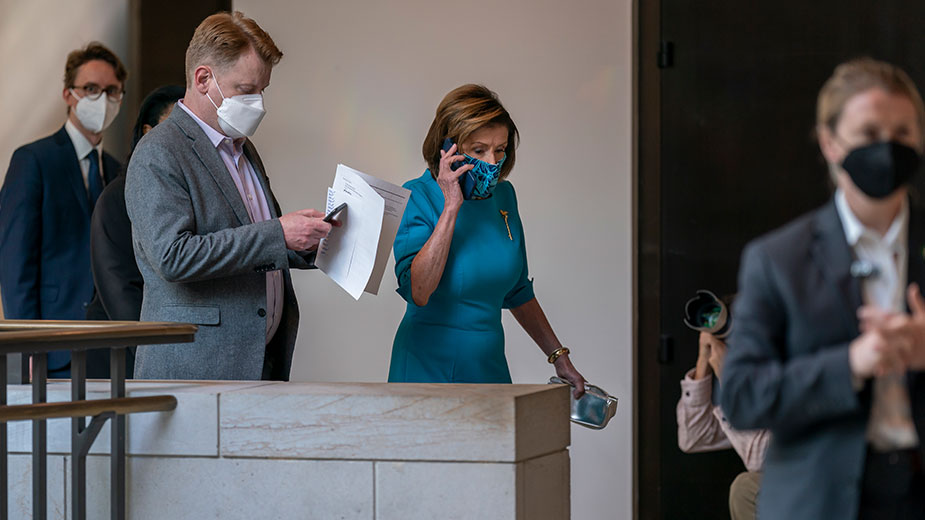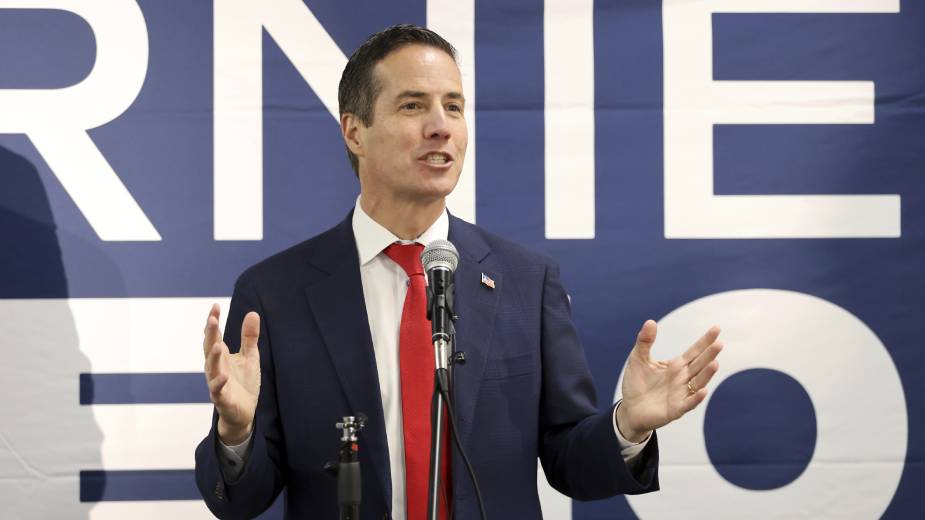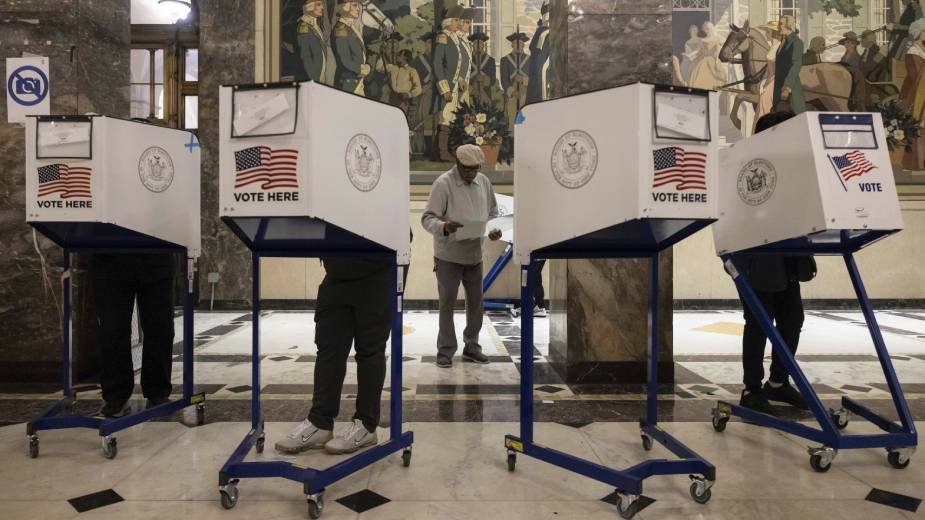Biden’s $1.85T Social and Climate Measure Passes House. What’s Inside?
By JOSH BOAK and KEVIN FREKING Associated Press
WASHINGTON (AP) — President Joe Biden’s $1.85 trillion plan to boost social and education programs as well as protect against global warming has passed the House, pushing it one step closer to law.
The 2,135-page bill includes universal preschool, funding to limit child care costs, expanded health care programs and a one-year continuation of a child tax credit, among many other provisions. But Democrats are scaling back some investments and shortening the timeframe for some programs to whittle down the cost. Some proposals have been dropped entirely.
The bill will still have to clear the Senate, where revisions are nearly certain. But Democrats are aiming to get it to Biden’s desk by Christmas. Republicans are lock-step against the measure, leaving Democrats to pass it on their own.
The vote comes days after Biden signed the $1.2 trillion Infrastructure Investment and Jobs Act into law. On Friday, congressional representatives from the Mahoning Valley voted along party lines for the Build Back Better Act.
In a press release issued Friday morning, U.S. Rep. Tim Ryan, D-13 Ohio, who voted for the bill, said it’s “fully paid for by making big corporations and the wealthiest pay their fair share.” He added it will help create jobs, cut taxes and deliver “transformative investments” needed to compete with China.
“These landmark bills are about putting money in the pockets of the American people and providing the resources we need to compete against China,” Ryan said. “I am proud that these bills cut taxes for working families, provide universal pre-school, cap child-care costs, ensure seniors don’t have to pay out of pocket for hearing aids, rebuild our roads and bridges, grow our domestic electric vehicle industry, remove dangerous lead pipes, create strong Buy America provisions, and so much more. We have to have the guts to take on China, lead the economies of the future, and put our families and our workers first. These bills do just that.”
In the statement emailed to press, Ryan said if the act is put into effect, it will, among other things:
- Expand access to free or reduced-cost child care for 745,004 Ohio children, and will ensure no Ohio family pays more than 7% of their income on child care.
- Expand access to free, high-quality pre-K education to 160,608 3- and 4-year-olds in Ohio.
- Provide a tax cut of up to $1,500 for 651,600 low-wage workers in Ohio by extending the American Rescue Plan’s Earned Income Tax Credit expansion.
- Allow 43 public community colleges in Ohio to benefit from grants to develop and deliver innovative training programs and expand proven ones, including those for in-demand jobs in public health, child care, manufacturing, information technology and clean energy.
- Expand rental assistance for Ohio renters.
In a video posted to his YouTube channel, U.S. Rep. Bill Johnson, R-6 Ohio, said the bill will “fundamentally change American – and not for the better.” Calling the bill a “far-left socialist dream,” Johnson, who voted against the legislation, contends it includes “subsidies for special interests, tax cuts for millionaires, mass amnesty for millions of illegal aliens, 80,000 new IRS agents who will spy on your bank account, and an assault on America’s fossil fuel energy sources,” including coal, oil and natural gas.
“Joe Biden’s and Nancy Pelosi’s reckless government spending has spiked inflation to a 30-year high,” Johnson said. “Gas prices are surging. As we enter the winter season, it will cost American families 50 percent more to heat their homes – leaving many out in the cold. And, next week’s Thanksgiving dinner will be the most expensive on record. This massive spending bill includes trillions for new ‘cradle-to-grave’ government programs designed to make millions of Americans dependent on Washington bureaucrats for their childcare, education and nutrition.”
Johnson urged U.S. Sens. Joe Manchin of West Virginia and Kyrsten Sinema of Arizona, both Democrats, “and other reasonable senators” to oppose the bill.
Citing a report from the Congressional Budget Office, U.S. Rep. Mike Kelly, R-16 Pennsylvania, said the bill will add $160 billion to the federal deficit over the next decade, and $800 billion to the debt in the next five years, according to a release by U.S. Rep. Jason Smith, R-8 Missouri, who is House Budget Committee Republican Leader.
Kelly, who also voted against the bill, contends the bill isn’t fully paid for.
“From day one, Republicans were pushed away from the negotiating table. Democrats decided to go it alone and did not include our constituents’ voices into these talks,” Kelly said in a release. “This bloated bill does not serve the American people. Instead, it wastes nearly $2 trillion at a time when our national debt is nearing $29 trillion. I cannot support such spending.”
Specific items Kelly points to in his opposition include $550 billion for the so-called “Green New Deal,” $80 billion for the IRS to double its agents, $412 billion in taxes on small businesses and $12,500 tax subsidies for families making $500,000 to buy “luxury electric vehicles,” according to his release.
Here’s what’s in the package, based on summaries provided by the White House and the House.
FAMILY/CHILD CARE
— Eligible workers would receive up to four weeks of paid leave to reimburse them for time taken to care for a new child or other family members or to recover from illness. Biden had initially proposed 12 weeks of paid family leave.
— Federal subsides would ensure that parents earning up to 250% of a state’s median income would pay no more than 7% of their income on child care. Parents must be working, seeking a job, in school or dealing with a health issue to qualify.
EDUCATION
— Universal prekindergarten would be established for all 3- and 4-year-olds and child-care subsidies would be provided for poorer and middle-income Americans. But the programs are funded only for six years.
— $40 billion would be provided for higher education and workforce development. This includes raising the size of Pell Grants and providing funding for historically Black colleges and universities as well as institutions that largely serve Hispanic students or tribal communities.
ENVIRONMENT/CLIMATE CHANGE
— Clean energy tax credits would receive $320 billion worth of funding. These credits over 10 years would help businesses and homeowners shift to renewable energy sources for electricity, vehicles and manufacturing.
— $105 billion would be spent to improve communities’ ability to withstand extreme weather events, which have been worsened by climate change. The funding would also create a Civilian Climate Corps that focuses on conserving public lands and bolstering community resilience to flooding, drought and other weather emergencies.
— $110 billion would help develop new domestic supply chains and develop new solar and battery technologies. Support would also be given to existing steel, cement and aluminum industries.
— $9 billion would be allocated for lead remediation projects, such as the replacement of water lines or the replacement of school drinking water fountains that may contain lead.
HEALTH CARE
— Medicare would be expanded to cover hearing aids, costing an estimated $35 billion over 10 years.
— Out-of-pocket Medicare Part D costs for older Americans would be capped at $2,000 per year and the price of insulin reduced to no more than $35 a dose.
— A Medicare drug negotiation program would be established. Each year, the secretary of Health and Human Services would identify 100 brand-name drugs that lack price competition and from that list negotiate the price of up to 10 drugs in 2025, 15 in 2026 and 2027, and 20 thereafter.
— Expanded tax credits to help cover insurance premiums under the Affordable Care Act would be extended through 2025. The White House says that would help 3 million uninsured people gain coverage.
— $150 billion would be given to a Medicaid program that supports home health care, helping to clear a backlog and improving working conditions.
— $90 billion would go toward investments that would include funding maternal health, community violence initiatives, disadvantaged farmers, nutrition and pandemic preparation.
HOUSING
— $150 billion would be committed toward housing affordability with a goal of building more than 1 million new rental and single-family homes. The goal would be to reduce price pressures by providing rental and down payment assistance.
TAX BREAKS
— An expanded child tax credit would continue for another year. As part of a COVID relief bill, Democrats increased the tax credit to $3,000 per child ages 6-17 and $3,600 per child 5 and under. Households earning up to $150,000 per year get the credit paid to them on a monthly basis.
— The expanded Earned Income Tax Credit that goes to 17 million childless, low-wage workers would continue for one year.
TAXES
— Biden’s plan bolsters the IRS to improve collections and close the gap between taxes owed and taxes paid.
— A 15% minimum income tax would be applied to large corporations. The U.S. would also be aligned with an agreement reached by more than 100 countries designed to deter multinational companies from stashing profits in low-tax countries.
— The bill would create a new surtax on multimillionaires and billionaires and close a provision that allows some wealthy taxpayers to avoid paying the 3.8% Medicare tax on their earnings.
— A $10,000 cap on state and local tax deductions would be raised to $80,000. Tax analysts say the change would largely benefit high-income households.
— A 1% surcharge would be imposed on corporate stock buybacks, which Democrats said are often used by corporate executives to boost their finances rather than investing in the business and its workers.
IMMIGRATION
— Those who entered the United States prior to Jan. 2, 2011, and have continuously resided there since would be eligible for renewable parole grants for five years after paying an administrative fee and completing security and background checks. The parole status gives recipients authorization to travel and work in the U.S. and deems them eligible for a Real ID-compliant driver’s license or a state identification card.
WHAT’S OUT OF THE BILL
— Democrats removed a proposal to expand Medicare to cover dental and vision care because of concerns about the cost.
— A proposal to allow for up to two years of free community college is also out.
The Business Journal contributed to this report.
Pictured: Speaker of the House Nancy Pelosi, D-Calif., walks to meet with reporters about plans to pass President Joe Biden’s domestic agenda as the House meets to debate the “Build Back Better” Act, at the Capitol in Washington, Thursday, Nov. 18, 2021. (AP Photo/J. Scott Applewhite)
Copyright 2024 The Associated Press. All rights reserved. This material may not be published, broadcast, rewritten or redistributed.



